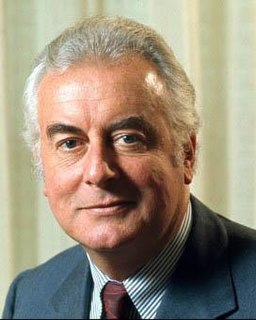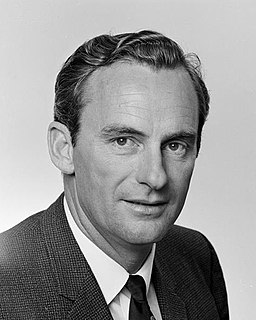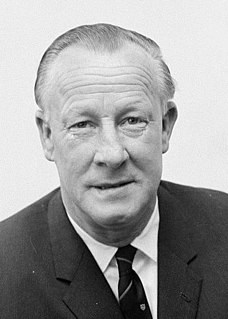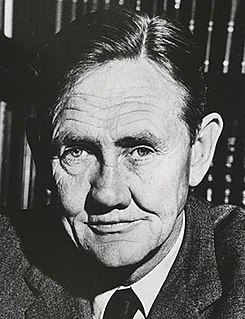
The Australian Labor Party (ALP), also simply known as Labor, is the major centre-left political party in Australia, one of two major parties in Australian politics, along with the centre-right Liberal Party of Australia. It has been in Opposition in the federal parliament since the 2013 election. The ALP is a federal party, with political branches in each state and territory. They are currently in government in Victoria, Queensland, Western Australia, South Australia, the Australian Capital Territory, and the Northern Territory. The Labor Party is the oldest political party in Australia.

Edward Gough Whitlam was the 21st prime minister of Australia, serving from 1972 to 1975. The longest-serving leader of the Australian Labor Party (ALP), he was removed as prime minister after controversially being dismissed by the governor-general of Australia, Sir John Kerr, at the climax of the 1975 Australian constitutional crisis. Whitlam is the only Australian prime minister to have been removed from office in this manner.

The 1975 Australian constitutional crisis, also known simply as the Dismissal, culminated on 11 November 1975 with the dismissal from office of the Prime Minister, Gough Whitlam of the Australian Labor Party (ALP), by Governor-General Sir John Kerr, who then commissioned the Leader of the Opposition, Malcolm Fraser of the Liberal Party, as caretaker Prime Minister. It has been described as the greatest political and constitutional crisis in Australian history.

James Ford Cairns, Australian politician, was prominent in the Labor movement through the 1960s and 1970s, and was briefly Deputy Prime Minister in the Whitlam government. He is best remembered as a leader of the movement against Australian involvement in the Vietnam War, for his affair with Junie Morosi and for his later renunciation of conventional politics. He was also an economist, and a prolific writer on economic and social issues, many of them self-published and self-marketed at stalls he ran across Australia after his retirement.

William George Hayden is an Australian politician who served as the 21st Governor-General of Australia from 1989 to 1996. He was Leader of the Labor Party and Leader of the Opposition from 1977 to 1983, and served as Minister for Foreign Affairs and Trade from 1983 to 1988 under Bob Hawke and as Treasurer of Australia in 1975 under Gough Whitlam.

Francis Daniel Crean was an Australian politician who served as a member of the House of Representatives from 1951 to 1977, representing the Labor Party. He was a minister in the Whitlam Government, including as Treasurer from 1972 to 1974 and Deputy Prime Minister for a few months in 1975.

Lance Herbert Barnard AO was an Australian politician and diplomat. He was the deputy leader of the Australian Labor Party (ALP) from 1967 to 1974 and held senior ministerial office in the Whitlam Government, most notably as Deputy Prime Minister of Australia from 1972 to 1974.
Richard William Brian Harradine was an Australian politician who served as an independent member of the Australian Senate, from 1975 to 2005, representing the state of Tasmania. He was the longest-serving independent federal politician in Australian history, and a Father of the Senate.

Clyde Robert Cameron,, was an Australian politician. He was a member of the Australian Labor Party (ALP) and served in the House of Representatives from 1949 to 1980, representing the Division of Hindmarsh. He was a leading figure in the Australian labour movement and held ministerial office in the Whitlam Government as Minister for Labour (1972–1974), Labor and Immigration (1974–1975), and Science and Consumer Affairs (1975).

The Whitlam government was the federal executive government of Australia led by Prime Minister Gough Whitlam of the Australian Labor Party. The government commenced when Labor defeated the McMahon Government at the 1972 federal election, ending a record 23 years of continuous Coalition government. It was terminated by Governor-General Sir John Kerr following the 1975 constitutional crisis and was succeeded by the Fraser Government—the sole occasion in Australian history when an elected federal government was dismissed by the head of state.
The following lists events that happened during 1975 in Australia.

The 1972 Australian federal election was held in Australia on 2 December 1972. All 125 seats in the House of Representatives were up for election, as well as a single Senate seat in Queensland. The incumbent Liberal–Country coalition government, led by Prime Minister William McMahon, was defeated by the opposition Labor Party led by Gough Whitlam. Labor's victory ended 23 years of successive Coalition governments that began in 1949 and started the three-year Whitlam Labor Government.

The 1969 Australian federal election was held in Australia on 25 October 1969. The incumbent Liberal–Country coalition government, led by Prime Minister John Gorton, won the election with a severely diminished majority over the opposition Labor Party, led by Gough Whitlam despite losing the two party popular vote. Both major parties had changed their leaders in the run-up to the election, the first time this had occurred since 1946. This was the first and only time that a Federal Government won a ninth consecutive term in office.

The McMahon Government was the period of federal executive government of Australia led by Prime Minister William McMahon of the Liberal Party. It was made up of members of a coalition between the Liberal Party and the Country Party, led by Doug Anthony as Deputy Prime Minister. The McMahon Government lasted from March 1971 to December 1972, being defeated at the 1972 federal election. Writing for the Australian Dictionary of Biography, Julian Leeser describes McMahon's prime ministership as "a blend of cautious innovation and fundamental orthodoxy".

A leadership election in the Australian Labor Party, then the opposition party in the Parliament of Australia, was held on 9 February 1967. It followed the resignation of previous leader Arthur Calwell. The contest was won by Calwell's deputy Gough Whitlam in a caucus ballot.

A leadership ballot in the Australian Labor Party, the opposition party in the Parliament of Australia, was held on 7 March 1960. It followed the retirement of previous leader H. V. Evatt. Calwell received 42 votes to Reg Pollard's 30 in a caucus ballot. Future Prime Minister Gough Whitlam would defeat Eddie Ward to become Calwell's deputy.

A leadership spill in the Australian Labor Party, the party of opposition in the Parliament of Australia, was held on 27 April 1966. It followed the long awaited challenge by party deputy-leader Gough Whitlam against incumbent leader Arthur Calwell. Calwell received 49 votes to Whitlam's 25 in a caucus ballot. After claiming victory Calwell then announced that if Labor was defeated at the impending 1966 federal election, he would not stand for the leadership again.

A leadership election of the Australian Labor Party (ALP), then the opposition party in the Parliament of Australia, was held on 22 December 1977. Following the resignation of Gough Whitlam former Treasurer Bill Hayden was elected Labor's new leader winning 36 votes to 28 over Lionel Bowen who was then elected deputy leader.

A leadership spill of the Australian Labor Party (ALP), then the opposition party in the Parliament of Australia, was held on 31 May 1977. Former Treasurer Bill Hayden unsuccessfully challenged Labor leader Gough Whitlam. Whitlam was narrowly re-elected by 32 votes to 30 leading him to later refer to many in his caucus as 'out of touch'.

A leadership spill in the Australian Labor Party, the party of opposition in the Parliament of Australia, was held on 27 January 1976, the date of the first Caucus meeting following the 1975 election.














